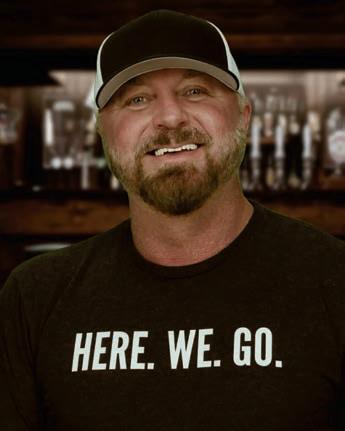
8 minute read
Feinstein’s at Hotel Carmichael Presents Comedian Todd McComas!

Presents: Comedian Todd McComas!
Advertisement
Writer // Janelle Morrison • Photography // Submitted
Feinstein’s at Hotel Carmichael is proud to present comedian Todd McComas! Todd McComas is a former Marine and retired police detective who now makes his living as a stand-up comedian, podcaster and radio personality. Many people know him from his time hosting Heartland Radio, as a member of “The Pat McAfee Show,” “Barstool Heartland” and his frequent appearances on “The Bob & Tom Show.” Todd now hosts the popular true crime podcast “10-41 with Todd McComas” and the comedy podcasts “Doc Heads” and “FUNTOWN.” His comedy album “Cop Stories” is available on Apple Music, Amazon Music, Spotify and Pandora. Todd can also be heard regularly on “Raw Dog Comedy” on Sirius XM.
Thursday, Sept. 9, 2021
Doors 6:00 p.m. Showtime 7:30 p.m.
Enjoy a prix fixe menu before the show. There is a $25 food and beverage minimum per person. Tickets are available at feinsteinshc.com.
Janelle Morrison: I’m curious about the evolution of your career. You were a Marine and police detective for 21 years before you became a comedian and professional podcaster. Let’s start from the beginning— where are you originally from?
Todd McComas: Originally, I am from Decatur County—just outside of Greensburg. I was raised in the country. We ended up living on my grandfather’s farm, and I would have to ride my bike probably 45 minutes to my nearest friend. We were out in the middle of nowhere, and I was not a “farm” kid. It just wasn’t in my DNA. I was a city kid plopped in the middle of a gigantic family tree that was meant to live in the country. They loved to hunt and fish and skin things, and I was a mild-hearted little kid that fell immediately in love with animals and didn’t want to eat them.

JM: Is this when you started to develop your sense of humor—as a survival tactic?
McComas: I embraced the fish-out-ofwater part of myself, and to do so, you have to be self-deprecating. I had to accept that I wasn’t as tough as my cousins, and I wasn’t going to grab this chicken and hold it down while somebody cuts its head off. But I’ll sit in the background and make jokes about it. So, yeah, I think that’s how it all started.
JM: What made you decide to join the U.S. Marine Corps and then join the Indiana State Police Department?
McComas: I was a good athlete. I mean, I wasn’t going to go pro or anything, but I was going to play college basketball in Vincennes University, but I just blew it off because I had zero discipline. I decided to join the Marine Corps. My dad was a Marine, and what better place to learn how to be disciplined?
I became a Marine, and by the time I left there to go back to school, I was a hard worker and knew how to devote myself to projects and became obsessed with completing things. I was a military policeman in the Marine Corps. I was actually a Marine Corps reservist but was activated during the Gulf War. And when you’re a very elite member of the Marine Corps like I was, something that they do in every war is take a group of people like me and put them as far away—geographically—as possible from the actual war. So, they put us in Norway. In case Saddam Hussein was going to take a turn and come at us from the very far north— like the North Pole.
JM: Did you decide that you wanted to be a cop based on your experiences as an MP?
McComas: I worked on a base for about a year because they had frozen rotations for the Marines [in the Gulf] to come home, and so we were fulfilling active-duty roles, and I ended up in South Carolina. Being an MP was not really police work. It’s more like you stand around a [military] plane and make sure nobody messes with it or you are standing at a front gate and wave cars in. When there’s an officer in the car, you salute them. That’s your job, and it was boring.
I had all these members in my units that were police and state troopers, and they would tell these awesome stories about car chases, bank robberies, and I was like, “Wow—I want to do that!”
When I got out of the Marines, I applied at every big police department in the Midwest—probably 12 different departments, including Indianapolis, Carmel and Indiana State Police. The Indiana State Police hired me, and the rest is history.
JM: You weren’t in uniform long before you became an undercover cop.
McComas: I only spent 15 months in unform. I became a detective very quickly. That was another point in my life where humor was very important. As a cop, you’re in competition with some of the greatest storytellers that walk the planet. There are cops that are amazing storytellers. There’s always competition for who’s going to tell the parts of the story [from a big raid or chase that happened], and eventually, everybody would leave it to me to tell the story. I didn’t know it at the time, but it was practice for how my comedy would eventually end up.
JM: Where does Pat McAfee come into your story?
McComas: I started [my comedy routine] with short little jokes and observational stuff like, “Don’t you hate this at the airport…”and stuff like that. Eventually, a buddy of mine was like, “Hey, you’ve got all these cool stories that you tell us from back when you were a cop. You need to tell those stories.” That person was Pat McAfee. He had heard me tell these on open mic night. They weren’t part of my hourlong set yet. And I wasn’t allowed to talk about [being a cop] for a long time. The fact that I was [actively] undercover, on a stage in front of a group of people, doesn’t lend itself well to “Hey, you guys wanna hear about me being a cop?”
When I left undercover [duty], I was allowed to start talking about being a cop and incorporated those stories into my headlining set. I work so hard in comedy, and thankfully when Pat McAfee gave me an opportunity to do radio and podcast shows and standup comedy, I jumped at it.
JM: Was there a moment or moments that impacted you so greatly that it helped develop you as the person you are today?
McComas: There are a couple of moments in my career that were real milestones, that gave me a sense of why I was put on this earth. There was a case where me and another large group of detectives rescued a woman who was kidnapped and held for ransom. It was just like the movies—she was taped up in a hotel room with a person holding a gun. We were able to covertly find her, kick in the door and save her. That was a moment where I was like, “OK—this is real. There are lives at stake.” I had worked a variety of crimes—everything from check fraud to murder—but that was one of the moments that was intensely real for me.
As far as who I am as a person, I went into the world of undercover for so long, I really developed an appreciation for who was on the other side of this. There is evil walking the planet. I’ve seen it. I’ve looked it in the eyes. But there are also people who commit crimes who are otherwise good people. They came up

under different circumstances or fell into a desperate situation or were weak in a moment. It’s so easy to develop an “us vs. them” mentality, but when you go undercover and you’re spending time with people, I saw more causation of crime— environmentally and situationally. It really changed my mindset, and it gave me a broad familiarity with the world. No matter where I’m at, I can always relate to people.
JM: Throughout 2020, the entertainment industry took a big hit not being able to perform live shows. We lost these outlets at which we could come together and explore and create humanity. What are your thoughts on the pandemic’s impact on comedy and on our society?
McComas: When we lost our ability to travel and to mix with strangers, we went to our primal instincts. The world developed an “us vs. them” mentality because we weren’t mixing with people with different opinions, religions and backgrounds. We were locked down in our own little neighborhoods. This will make an interesting behavioral analysis study at some point.
As far as comedy was affected, if you can get everyone to laugh at the same thing, which is not as easy as it looks, you see people start to relax and let loose with laughter. I’m still seeing crowds take longer to let their guard down, but it’s my job to make sure this happens, and it’s super rewarding because you see their mind’s eye go back to a time when they didn’t have to worry so much about things, and it feels really good.
JM: What can people expect to experience at your show when you come to Feinstein’s at Hotel Carmichael?
McComas: I love nothing more than an intimate show. I will tell my story through my experiences as a child, a Marine, a cop and a father. I’m sharing the funny moments that shaped me. They weren’t necessarily funny when they were happening, but in retrospect— they’re hilarious.
Follow Todd McComas on social media @ToddMcComas and check out his website at toddcomedy.com for a complete listing of his appearances, comedy schedule and documentaries. And be sure to check out his project involving the pop culture phenomenon “Tiger King.”



CABINETRY • FURNITURE • FLOORING LIGHTING • PLUMBING • & MORE 317.472.9800
IndyHomeDesignCenter.com
8450 Westfield Blvd #100 • Indianapolis





